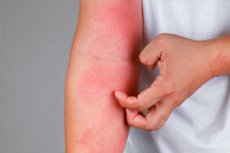New publications
Atopic dermatitis severely affects sexual function in women
Last reviewed: 02.07.2025

All iLive content is medically reviewed or fact checked to ensure as much factual accuracy as possible.
We have strict sourcing guidelines and only link to reputable media sites, academic research institutions and, whenever possible, medically peer reviewed studies. Note that the numbers in parentheses ([1], [2], etc.) are clickable links to these studies.
If you feel that any of our content is inaccurate, out-of-date, or otherwise questionable, please select it and press Ctrl + Enter.

Most women with atopic dermatitis experience decreased sexual function, and about half of them believe that atopic dermatitis may affect their desire to have children, according to a study published in the journal Acta Dermato-Venereologica.
Juan-Ángel Rodríguez-Pozo from the Virgen de las Nieves University Hospital in Granada, Spain, and colleagues examined the impact of atopic dermatitis on sexual function and reproductive desire among women in a cross-sectional study conducted from February to March 2022. A total of 102 women with atopic dermatitis were recruited through online surveys.
The researchers found that 68.6% of women reported a deterioration in sexual function, especially those with more severe disease and involvement of the genital and buttock areas. About half (51%) of the women believed that atopic dermatitis could affect their desire to become pregnant, especially those with involvement of the buttock area.
"Atopic dermatitis affects quality of life, sexuality and desire to have children. Controllable factors such as severity and prevalence of symptoms increase this impact. Despite this, patients rarely seek dermatological advice," the authors write. "In this situation, it is necessary for dermatologists to pay more attention and approach patients with atopic dermatitis more holistically, emphasizing psychological and social aspects such as sexuality and reproductive desires."
